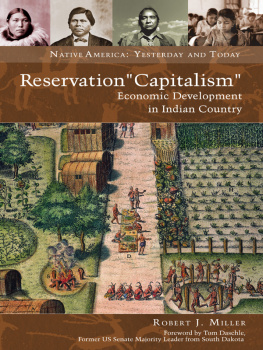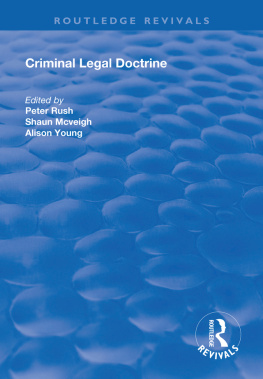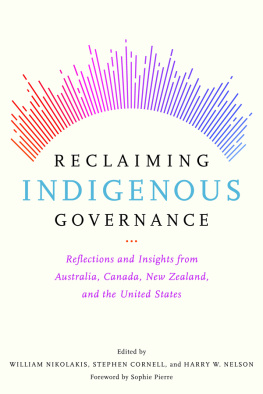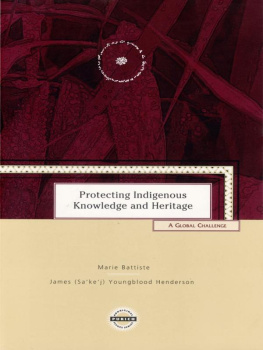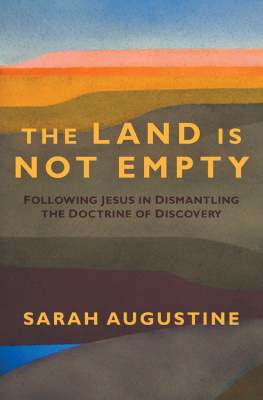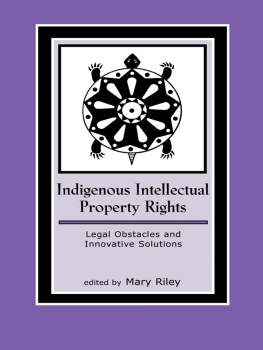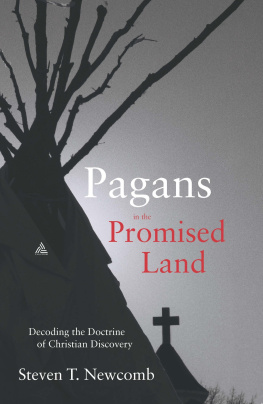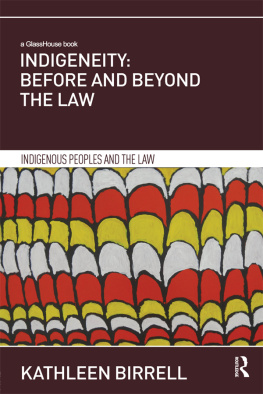DISCOVERING INDIGENOUS LANDS
Discovering Indigenous
Lands
The Doctrine of Discovery in the
English Colonies
ROBERT J. MILLER, JACINTA RURU, LARISSA
BEHRENDT, AND TRACEY LINDBERG


Great Clarendon Street, Oxford OX2 6DP
Oxford University Press is a department of the University of Oxford.
It furthers the Universitys objective of excellence in research, scholarship,
and education by publishing worldwide in
Oxford New York
Auckland Cape Town Dar es Salaam Hong Kong Karachi
Kuala Lumpur Madrid Melbourne Mexico City Nairobi
New Delhi Shanghai Taipei Toronto
With offices in
Argentina Austria Brazil Chile Czech Republic France Greece
Guatemala Hungary Italy Japan Poland Portugal Singapore
South Korea Switzerland Thailand Turkey Ukraine Vietnam
Oxford is a registered trade mark of Oxford University Press
in the UK and in certain other countries
Published in the United States
by Oxford University Press Inc., New York
Robert J. Miller, Jacinta Ruru, Larissa Behrendt, and Tracey Lindberg, 2010
The moral rights of the authors have been asserted
Crown copyright material is reproduced under Class Licence
Number C01P0000148 with the permission of OPSI
and the Queens Printer for Scotland
Database right Oxford University Press (maker)
First published 2010
All rights reserved. No part of this publication may be reproduced, stored in a retrieval system, or transmitted, in any form or by any means, without the prior permission in writing of Oxford University Press, or as expressly permitted by law, or under terms agreed with the appropriate reprographics rights organization. Enquiries concerning reproduction outside the scope of the above should be sent to the Rights Department, Oxford University Press, at the address above
You must not circulate this book in any other binding or cover
and you must impose the same condition on any acquirer
British Library Cataloguing in Publication Data
Data available
Library of Congress Cataloging-in-Publication Data
Typeset by Newgen Imaging Systems (P) Ltd., Chennai, India
Printed in Great Britain
on acid-free paper by
CPI Antony Rowe
ISBN 9780199579815
1 3 5 7 9 10 8 6 4 2
Foreword
How can Canada claim to own Indigenous peoples lands and resources? My grandfather asked me questions like this when I was still in grade school. My mother echoed these questions throughout my childhood. Neither was legally trained, but both spent their formative years on the Cape Croker Indian Reserve in southern Ontario. They knew from experience, and that of their community, that something was not right about how Canada purported to take our homelands. Their questions about Canadas claims were a natural and common part of my young everyday life. They wanted answers, and they would ask anyone for help in their quest, including their children.
For generations these same questions have been circulating within Indigenous communities throughout the world. Thus it should come as no surprise that these concerns followed Indigenous people when they entered law school. And it should be noted that, by most measures, Indigenous people have really only entered law school for the first time over the past thirty years. After gaining important initial experiences in diverse fields of legal practice or securing advanced degrees, the first generation of Indigenous law professors are now making their presence known in the wider world. Their voices are being heard beyond their communities, offices, and lecture halls. This book denotes the expansion of this work and signals the persistence of their ancestors inquiries.
In Discovering Indigenous Lands you will encounter the voices of four distinguished Indigenous academics from the United States, Australia, New Zealand, and Canada. They ask and answer questions posed to me by my grandfather and mother. They show that when Indigenous lands were claimed by other countries there was no persuasive justification for this act. The doctrine of discovery, which supposedly undergirds the taking of Indigenous lands, is fully discredited by the authors of this book. They show how it is contrary to International and Indigenous legal orders. They demonstrate how the doctrine of discovery is inconsistent with domestic legal regimes that aspire to incorporate broader human rights concerns.
Professor Robert Miller is the first to write in this collection. An enrolled citizen of Oklahomas Eastern Shawnee Tribe, he writes with authority and concision. His previous book demonstrated how Thomas Jefferson deployed the doctrine of discovery against American Indians and their governments. That work, entitled Native America, Discovered and Conquered: Thomas Jefferson, Lewis and Clark, and Manifest Destiny, marked the arrival of a sharp new scholar in American legal history. In the present book Professor Miller builds on his previous work to detail the doctrine of discoverys development from medieval times to the present. He shows how American colonies and US Presidents, legislatures, and courts have problematically relied upon this doctrine to dispossess the countrys first peoples. He demonstrates how this doctrine relies on the assumed superiority of Euro-American religions, cultures, and race to the detriment of Native American peoples.
Professor Tracey Lindbergs chapters about Canadian law are the next to appear in this book. She is a gifted scholar who incorporates Neheyiwak (Cree) principles throughout the body of her work. I was first introduced to Traceys writing through a graduate thesis she wrote at Harvard Law School wherein she skillfully critiqued the stereotyping of Indigenous women in Canadian political and legal thought. Dr Lindbergs award-winning doctoral thesis is also a groundbreaking academic work. In Discovering Indigenous Lands Professor Lindberg demonstrates how Canadian law applies the doctrine of discovery despite its pretence to be following higher principles. The thesis of her contribution is that [t]he Doctrine of Discovery in Canada may not be as evident on the face of the law as in other countries, but the assumption of authority under Discovery indisputably informs the development of policy and legislation in that country. She writes with grace, power, and clarity.
Professor Larissa Behrendt is the third of four authors to write in this book. She is an Eualeyai/Kamillaroi woman, and one of Australias most prominent Aboriginal intellectuals. She has published two acclaimed novels and numerous books and articles on Indigenous life and law. When I first met Larissa she had just finished a doctorate at Harvard Law School and was working with Harold Cardinal, who was perhaps Canadas most influential Aboriginal political writer of the twentieth century. After successfully working with Canadian First Nations, Larissa moved home to become a Professor of Law and Director of Research at the Jumbunna Indigenous House of Learning at the University of Technology, Sydney. This is where she still teaches. Professor Behrendts thesis in this book is that the doctrine of discovery continues to contribute to the erosion of Aboriginal peoples participation in public life. She shows how the assumption of inferiority that underlies the doctrine still allows contemporary Australian governments to override Aboriginal rights. The doctrine of discovery justifies suspending protection against racial discrimination by denying them meaningful community governance and violating their human rights. Her insights in this book are profound.
Next page

